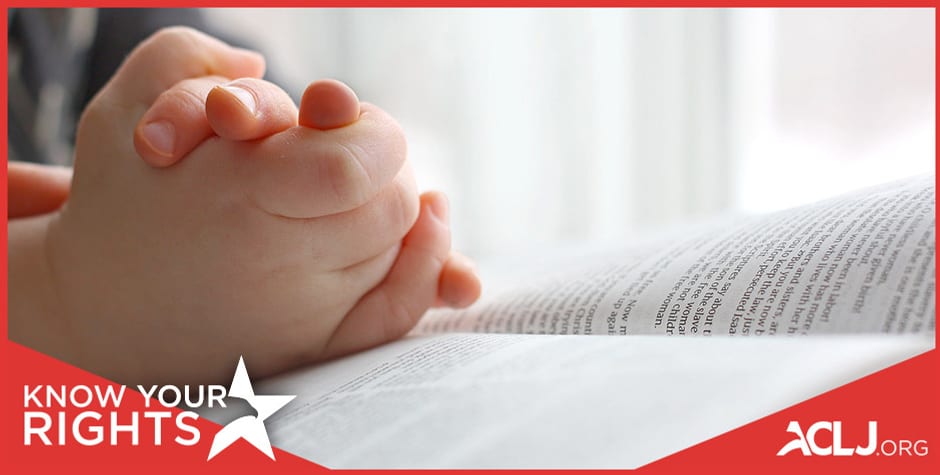Know Your Rights: Your Kids Have the Right To Bring Their Bibles to Public Schools
Listen tothis article
What if your child brings their Bible to school and is then reprimanded by the school for doing so? What if your child decides to read their Bible during non-instructional time and is similarly reprimanded by the school? What if your child is asked to write about their hero in a class assignment and is then reprimanded for writing about a religious figure?
Unfortunately, such actions by public school teachers and administrators are becoming more common. But the ACLJ has been very successful in defending your children’s constitutional rights – including the right to take their Bibles to school, read them on school grounds during non-instructional time, and use them in applicable school assignments.
In response to this troubling trend, the ACLJ has written a legal memo addressing why, in general, public schools cannot ban students from bringing their Bibles to school. Our memo begins with the First Amendment to the United States Constitution, which reads in part: “Congress shall make no law . . . prohibiting the free exercise thereof [i.e., of religion]; or abridging the freedom of speech . . . .” We note in our memo that the Supreme Court of the United States has long held, including recently in Kennedy v. Bremerton Sch. Dist., that “[t]hese [two] clauses work in tandem. Where the Free Exercise Clause protects religious exercises, whether communicative or not, the Free Speech Clause provides overlapping protection for expressive religious activities.”
Importantly, and as our memo explains, the Supreme Court made clear that First Amendment protections extend to public school teachers and students. As we note in our memo, in Tinker v. Des Moines Independent Community School District, the Supreme Court wrote that “state-operated schools may not be enclaves of totalitarianism. School officials do not possess absolute authority over their students.” The Supreme Court continued:
The principle of these cases is not confined to the supervised and ordained discussion which takes place in the classroom. The principal use to which the schools are dedicated is to accommodate students during prescribed hours for the purpose of certain types of activities. Among those activities is personal intercommunication among the students. This is not only an inevitable part of the process of attending school; it is also an important part of the educational process. A student’s rights, therefore, do not embrace merely the classroom hours. When he is in the cafeteria, or on the playing field, or on the campus during the authorized hours, he may express his opinions, even on controversial subjects…. (emphasis added).
The Supreme Court has further made clear that religious speech is no exception. As we explain in our memo, these First Amendment protections logically extend to students who bring their Bibles to school. In light of these protections, our memo also briefly discusses the fact that the Supreme Court has established reasonable limits to ensure that public schools (for example) can operate efficiently.
Our memo concludes with the U.S. Department of Education’s “Guidance on Constitutionally Protected Prayer and Religious Expression in Public Elementary and Secondary Schools,” which was released on May 15, 2023 (“DOE Guidance”). The DOE Guidance, for example, states that the First Amendment does not convert “public schools into religion-free zones, or require[] students, teachers, or other school officials to leave their private religious expression behind at the schoolhouse door.” The DOE Guidance also explains that students “may read from religious materials [Bibles, for example] . . . or study religious materials with fellow students during non-instructional time (such as recess or the lunch hour) to the same extent that they may engage in nonreligious activities.” The DOE Guidance further notes that students “may express their beliefs about religion in homework, artwork, and other written and oral assignments free from discrimination based on the religious perspective of their submissions.”
With the above in mind, the most important takeaway from our memo is that, in general, public schools cannot ban students from bringing their Bibles to school.
The ACLJ is dedicated to defending your constitutional rights. We have been providing assistance and legal representation, at no cost or charge, to people just like you for decades. If your (or your child’s) rights are being violated in this area, please contact us at ACLJ.org/HELP.
Learn more about your constitutional rights at ACLJ.org/Know-Your-Rights.
